Everything You Need to Know About Traveling During COVID-19
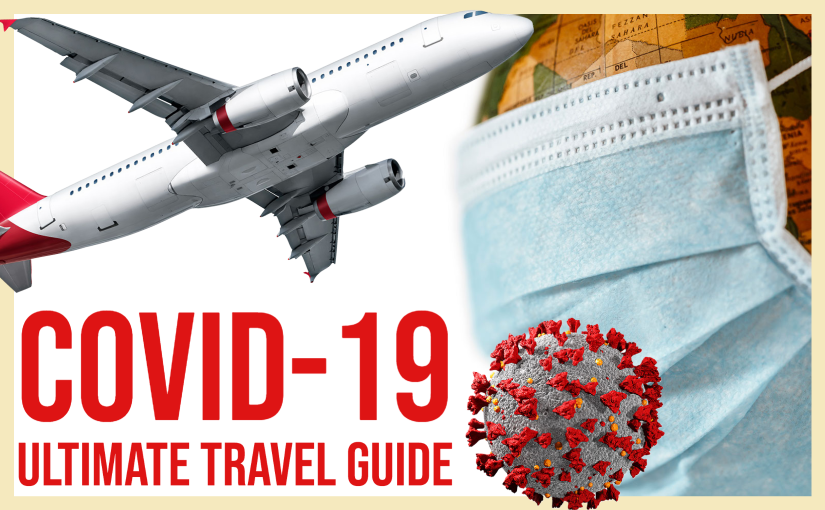
When the pandemic first began, or to be more precise when it first started getting more media coverage and we got to know about it, the entire world shut down. Flights were grounded, businesses were closed – in fact, many countries imposed a curfew that restricted people from leaving their homes completely.
Nearly nine months later, we’re beginning to see the light at the end of the tunnel. As doctors, scientists, and researchers work together to better understand the virus and develop a vaccine, people have learned how to live their lives around COVID-19. Masks are now mandatory in most public places, online gatherings have become the norm, and it’s common to see people getting their temperature checked at entrances before being allowed in. Just like the food and beverage industry or the entertainment industry have adapted, so has the travel industry. In this article we’re going to delve into exactly what changes have been made and what they mean for the everyday tourist.
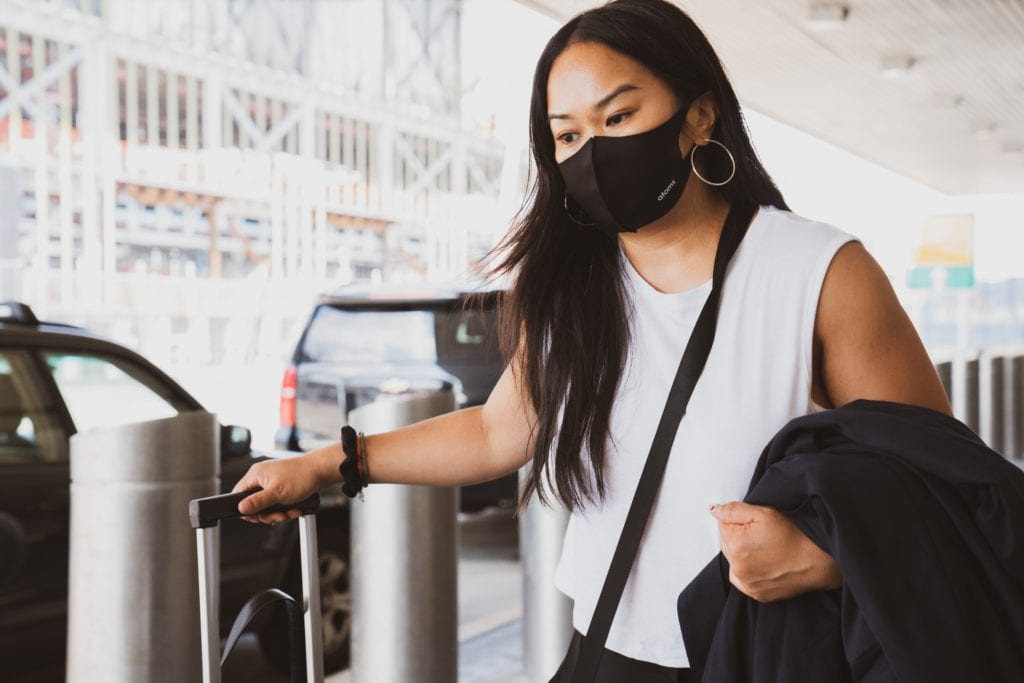
Traveling During Pandemic
It may seem like a really simple answer but there are some really basic things you can look out for or do to protect yourself and your family while traveling. One, if you’re feeling under the weather at all, even if it is just a headache, cancel your trip and stay at home. A wide range of symptoms have been reported by coronavirus patients, ranging from mild to severe illness, and could include fever, chills, cough, sore throat, fatigue, headache, body aches, runny nose, nausea, vomiting, diarrhea, shortness of breath, loss of smell or taste, confusion, pressure or pain in chest, inability to stay awake, or bluish lips or face. The coronavirus presents itself differently in different people; some of us can be completely asymptomatic but still spread the disease to others unknowingly. So, if you feel even just a little off, it’s best to stay at home during this time.
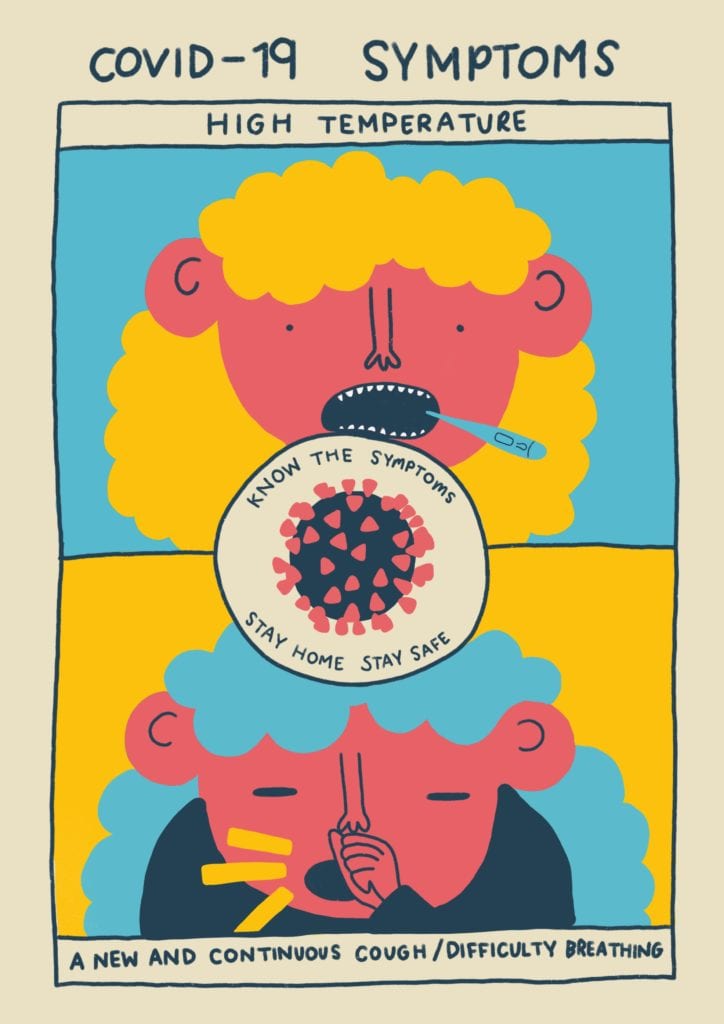
Other measures you can take to protect yourself and others while traveling is to wear your mask properly. The CDC has stated time and again that wearing a mask in public settings can help protect yourself from getting or spreading COVID-19. People over the age of two should always wear a mask at places such as the gas station, car rental office, bus station, airport, or any place where you are indoors or cannot keep a six feet distance between you and others during your travels. Masks should have two or more layers and should be worn over your nose and mouth (secured under your chin) to be effective.
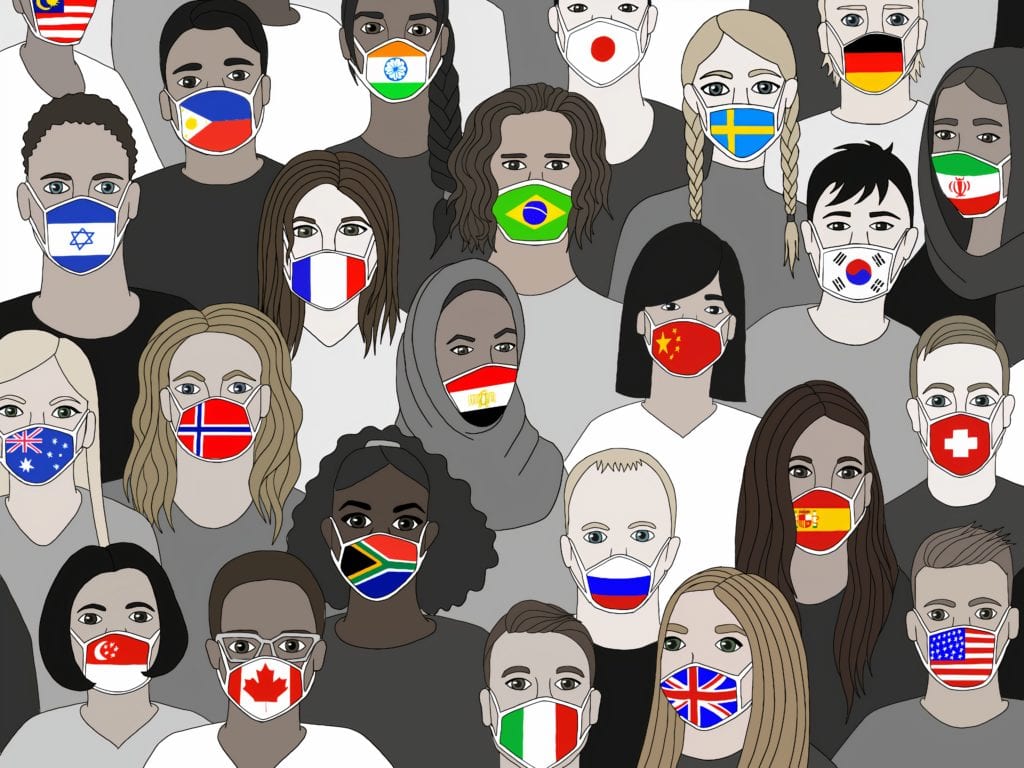
And one of the other most basic measures you can take to reduce your contact with the coronavirus while traveling is to wash your hands regularly to prevent the spread of germs. Washing your hands with soap and water whenever possible can get rid of any lingering germs you may have come across. Remember, COVID-19 cannot be caught by just touching an infected surface but if you then touch an infected surface with your hands and you then eat something without washing your hands first, you may contract the virus. If you don’t have soap and water readily available, you can also use a FDA-approved hand sanitizer with at least 60% alcohol.
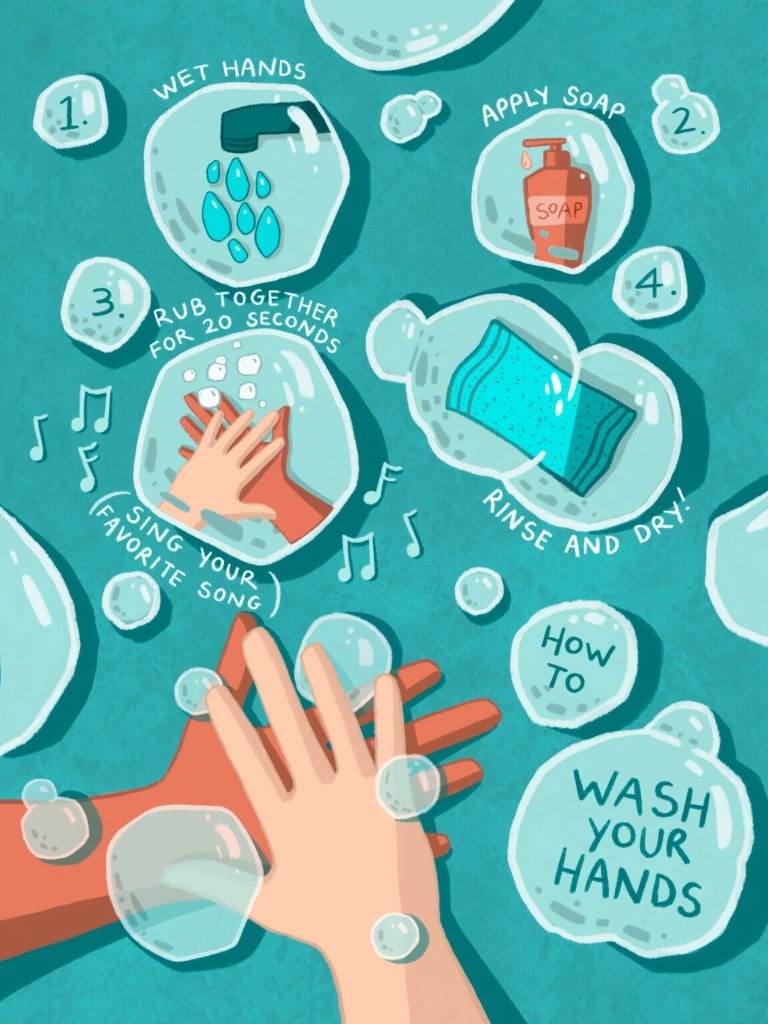
Do I need to get tested before I travel?
Getting tested before traveling really depends on where you’re going, how you’re getting there, and whether you want to take the extra precautionary measure or not. For example, if you’re planning on driving to your destination or going on a road trip, then testing is often not mandatory. Within the United States, a COVID-19 test is not required for inter-state travel based on your mode of travel whether it be in your own car or a rental car, on a public bus or train, or even for domestic air travel. On the other hand, cities and states may have rules in place if you’re planning on staying there that require a test or quarantine. That being said, if you’re traveling within the United States but are planning on visiting elderly or immuno-compromised friends or family, you may want to get tested prior to your travels anyway.
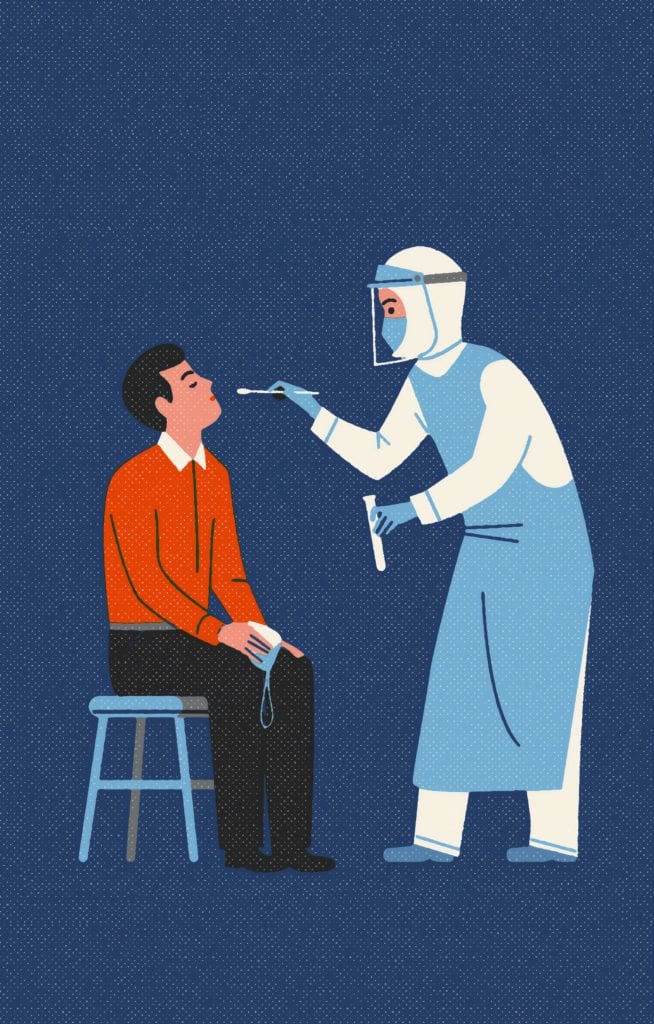
If you’re planning on traveling internationally by plane, it is recommended that you get tested one to three days before your departure. Social distancing can prove to be difficult on crowded flights or busy airports; sitting within six feet of others for prolonged periods of time can increase your chances of getting and spreading the disease. You’ll also be in contact with frequently touched surfaces such as in the airport terminals or security lines. Travelers who get tested before their flight can reduce the spread and cancel their trip if they test positive but didn’t know because they were asymptomatic. If you test negative, keep a copy of your results with you during your entire trip as you may be asked for them.
Certain destinations require testing before or after arrival, meaning you’ll have to take a test before boarding or once you land at your final destination. Other locations mandate a 14-day quarantine period upon arrival so be sure to take that into account when booking your hotel and creating a budget. A couple of countries that have a compulsory COVID-19 testing requirement are Germany, Greece, and France, though the latter only applies to U.S. citizens and a few other ‘red list’ countries. You can check our list at the end of this article to get up to date travel information specific to each country.
Always check the requirements of any countries you’re visiting or even transiting in on a regular basis as rules are changing daily.
How safe is air travel and can flying on an airplane increase your risk of getting COVID-19?
From the moment you enter an airport you are exposed to so much more than you usually would be at home or in your regular place of work. You’ll be in close contact with people from all over the world as you stand in the TSA line. You’ll have to touch random surfaces as you sit at the gate waiting for your flight. Finally, you’ll spend hours on a plane seat that others have been in within the last 24 hours – what if they sneezed on your fold-down tray while they were eating?
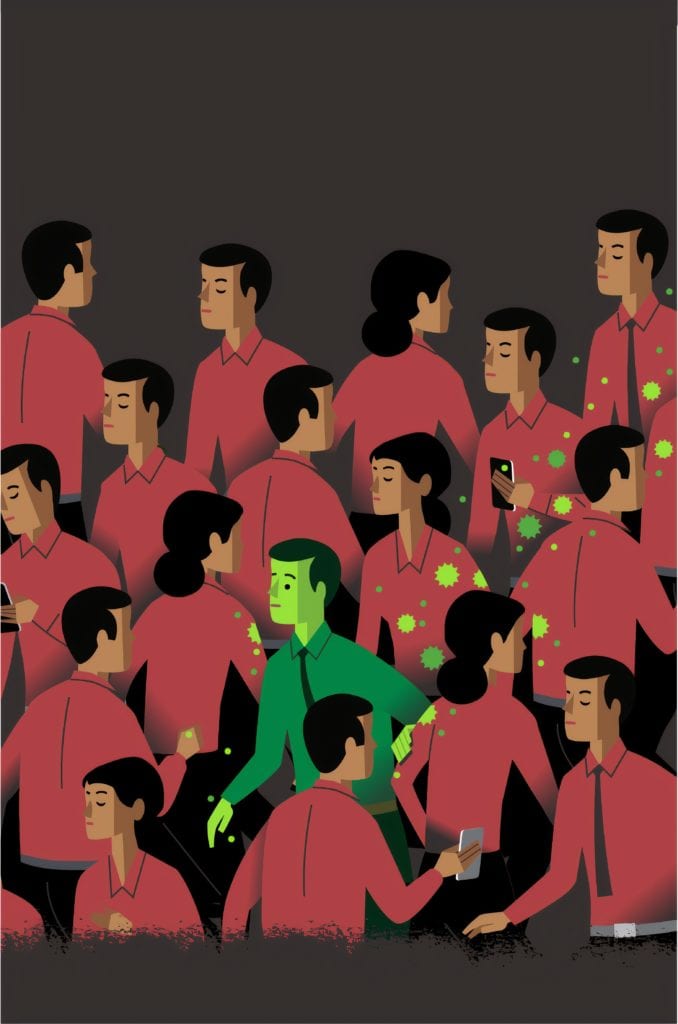
It’s no surprise that the first thing airlines did when reopening during a pandemic was to assess every situation a traveler may face, including the ones we’ve mentioned above. Airlines are taking a multilayered approach to safeguard the health of travelers as well as their employees. This includes extensive measures such as physical distancing, making sure that everyone wears masks at all times, placing handwashing and hand sanitizing stations at every corner, and implementing on-site rapid testing to prevent sick passengers from boarding. Airlines are also working with domestic and international researchers and health agencies to create and execute comprehensive cleaning and disinfecting approaches for all areas that visitors will spend time, especially the airplane cabin and flight deck.
Many studies have concluded that flying on an airplane will not increase your chances of catching COVID-19 as the High Efficiency Particulate Air (HEPA) filters used in modern aircraft ventilation systems actually help prevent the spread of the virus. Similar to filters used in hospital ventilation systems, these systems have shown to remove over 99.9% of viruses – that means that the chance of the virus being spread on even a packed flight is extremely low.
Most airplanes such as Boeing claim that their systems minimize the spread of airborne contaminants because of several aspects. One, cabin air is exchanged every few minutes, meaning that the air being circulated is filtered often. Second, the airflow in a cabin flows in a circular pattern from the ceiling to the floor, meaning that it compresses airborne particles and pushes them toward the bottom where the filters are. This minimizes the number of airborne particles floating around to land on commonly used surfaces and such. Even on a full flight the design of the cabin combined with the airflow system creates the equivalent of over seven feet of physical distance between passengers.
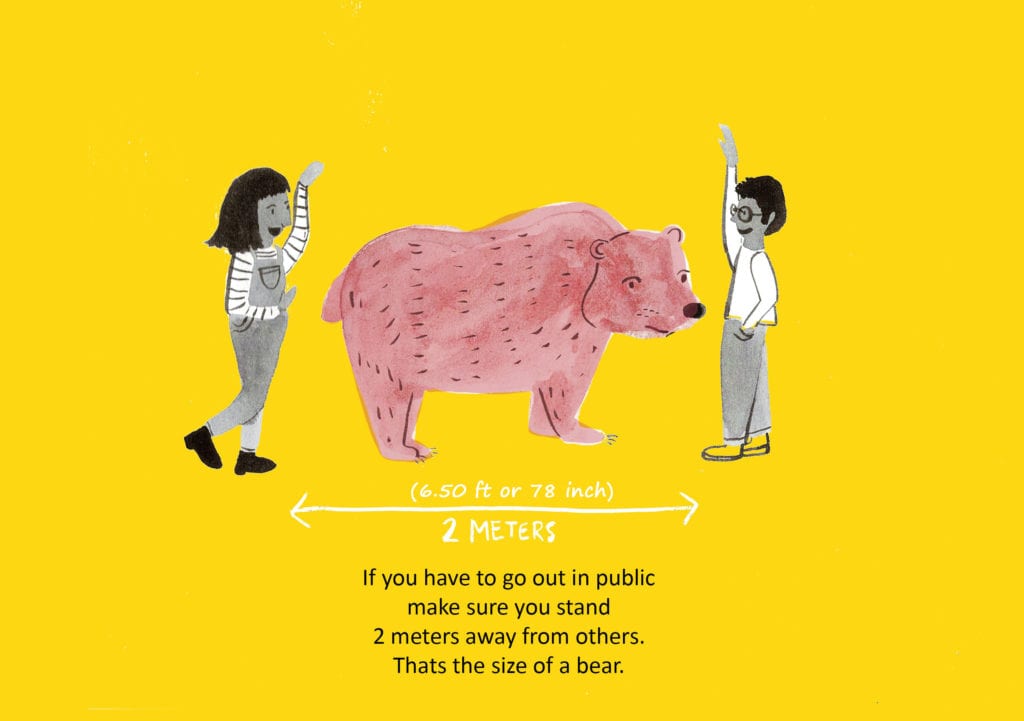
What happens if there is a sick passenger on an international or domestic flight?
If there is a sick passenger on an international or domestic flight, chances are that you won’t hear about it until days, weeks, or even months later. Because of all the additional measures such as onsite rapid testing and additional screenings, most people who are infected while traveling may be asymptomatic or in the early stages when a negative result is still possible. This means that you won’t hear about it until much later.
Once a person who has traveled on a flight with you does become sick, the process of contacting everyone they’ve been in close proximity with while they were infectious is rather speedy. A public health official contacts the CDC who then starts a contact investigation; this includes them contacting and informing everyone the sick person may have exposed the virus to. Make sure that your contact information is always correct and updated when you travel so that the CDC can reach you if necessary and inform you of any additional measures you may need to take to protect yourself and others.
Where can I travel to during COVID-19?
Crossing state lines is proving to be much easier if you’re in the continental U.S. Different cities and states have placed some travel restrictions to minimize the spread of the virus as much as possible. For example, if you’re visiting Maine you’ll either have to quarantine for 14 days or sign a Certificate of Compliance that says you received a negative test result within 72 hours of arriving in the state. Massachusetts, New Hampshire, New York, New Jersey, Connecticut, Vermont, and Chicago also have similar travel restrictions in place, with hefty fines or jail time given to those who don’t comply. Flying to Hawaii became a bit easier; since March travelers had to abide by a mandatory 14-day quarantine upon arrival but the state has recently amended their regulations to allow travelers without a mandatory quarantine as long as they’ve had a negative test within 72 hours prior to their departure. Test results taken after a visitor has already arrived will not be accepted so make sure you stay up to date with the ever-changing regulations of each city and state you’re visiting.
The chart below breaks down the COVID-19 travel regulations imposed by each country and gives you the details you need to know. Many countries that have still banned international visitors, or visitors from “hot zones” like the U.S. are not listed. We would still suggest visiting the embassy website of the country you’re going to to clarify prior to confirming your travel plans. The U.S. Department of State also has up to date information on travel restrictions in each country as well as access to resources you may need while abroad or during an emergency.
| Country | COVID-19 Testing | Quarantine | Additional Info |
|---|---|---|---|
| Albania | No test required | No quarantine required | • Subject to temperature checks and health screening procedures upon arrival • Restrictions to what countries you can pass through when leaving |
| Antigua and Barbuda | Negative coronavirus test taken no more than 7 days prior to arrival | No quarantine required | • Subject to temperature checks and health screening procedures upon arrival |
| Armenia | Negative coronavirus test | If a negative coronavirus test is not presented, must quarantine for 14 days upon arrival | • Face masks are required in public spaces throughout the country |
| Aruba | • Negative coronavirus test for everyone 15 and older • Can be tested before arrival or upon arrival | No quarantine required | • Subject to temperature checks and health screening procedures upon arrival • Travelers coming from ‘hot spot’ states in the U.S. may be subject to more testing • Aruba Visitor Insurance is mandatory for all U.S. travelers to ensure coverage if any health issues arise during their stay |
| The Bahamas | Negative coronavirus test taken no more than 5 days prior to arrival | No quarantine required | • Travelers must complete a Travel Health Visa Application which includes a mandatory health insurance that will cover travelers the entirety of their stay • If you travel around the Bahamas without a face mask, you will be subject to fines |
| Bangladesh | Negative coronavirus test taken within 72 hours before entry | A 14-day quarantine period may be imposed | Subject to temperature checks and health screening procedures upon arrival |
| Barbados | Negative coronavirus test taken within 72 hours before entry | • U.S. citizens are required to quarantine at a government facility (at no additional cost) until they get a second negative COVID-19 test result; you can choose to quarantine at an approved hotel instead (at your own expense) • Travelers from the U.S. and other high-risk countries must then be retested within four to five days; if it is negative, the can move around the island freely | Completed online travel form no less than 24 hours before their flight |
| Belarus | No test required | No quarantine required | Subject to temperature checks and health screening procedures upon arrival |
| Belize | Negative coronavirus test taken within 72 hours before entry If you don’t test prior to departure, you have to take a test upon arrival at your own cost | No quarantine required | • Visitors must stay at a ‘Gold Standard Hotel” which are hotels with a high emphasis on health and cleanliness • U.S. visitors must complete health forms on the Belize Health App to gain entry into the country |
| Bermuda | • Negative coronavirus test taken no more than 7 days prior to arrival • Travelers are tested again upon arrival • Additional tests on day 4, day 8, and day 14 of your stay | Quarantine until negative results come back from the test taken upon arrival (around 24 hours) | • Travelers must submit a travel authorization form ($75) • Travelers must take their temperature twice a day for the entirety of their stay and report it through an online portal |
| Bonaire | Negative coronavirus test taken within 72 hours before entry | No quarantine required | • Travel medical insurance is mandatory • Travelers must complete a health declaration form prior to arrival |
| Bosnia and Herzegovina | Negative coronavirus test taken within 48 hours before entry | No quarantine required | Subject to temperature checks and health screening procedures upon arrival |
| Brazil | No test required | No quarantine required | Subject to temperature checks and health screening procedures upon arrival |
| Cambodia | Negative coronavirus test taken within 72 hours before entry Travelers are tested again upon arrival | • If multiple people on a flight test positive upon arrival, everyone on that particular flight must quarantine in a government-approved establishment, then get retested at the end of the quarantine period • If results are negative upon arrival, visitors may still need to self-quarantine at their hotel | • Travelers must pay a $2,000 deposit to cover the costs of testings, lodging, and potential medical treatment. Some money will be returned if a person does not need $2,000 worth of assistance. • Additional health insurance package is required ($90) |
| Chile | Negative coronavirus test taken within 72 hours before entry | Self-quarantine for 14 days upon arrival (in effect until December 7th, 2020) | • Must complete a “Affidavit of Travelers” • Must have proof of health insurance that covers international travel, specifically any coronavirus-related health issues |
| Columbia | Proof of negative COVID-19 test required | No quarantine required | • Subject to temperature checks and health screening procedures upon arrival • Travelers must complete an immigration form |
| Costa Rica | No test required | No quarantine required | Visitors must purchase medical insurance that will cover any coronavirus-related health issues |
| Croatia | Negative coronavirus test taken within 48 hours before entry | Quarantine is required for those with no tests or expired tests | • Subject to temperature checks and health screening procedures upon arrival • Proof of paid accommodation is necessary |
| Curacao | Negative coronavirus test taken within 72 hours before entry | Residents visiting from the states not specifically allowed must quarantine for 14 days | • Only residents from Connecticut, Florida, New Jersey, and New York are permitted to enter; travelers from all other states must get specific permissions to travel to Curacao • Travelers must have health insurance • Travelers must complete an online immigration card as well as a Health Department passenger locator card |
| Democratic Republic of the Congo | • Negative coronavirus test taken no more than 7 days prior to arrival for all visitors over the age of 11 • Travelers are tested again upon arrival | Quarantine until negative results come back from the test taken upon arrival | • Proof of health and medical evacuation insurance is mandatory • Travelers must also present negative COVID-19 test results taken within 3 days prior to their exit from the Democratic Republic of the Congo |
| Djibouti | No test required | No quarantine required | Subject to temperature checks and health screening procedures upon arrival |
| Dominica | • Negative coronavirus test taken within 72 hours before entry • May be subject to another test on arrival • Negative coronavirus test taken five days after arrival | Quarantine for five days | Subject to temperature checks and health screening procedures upon arrival |
| Dominican Republic | Travelers are chosen at random to have coronavirus tests upon arrival | No quarantine required | • Subject to temperature checks and health screening procedures upon arrival • Travelers must complete a Traveler’s Health Affidavit |
| Ecuador | Negative coronavirus test taken within 10 days before entry If no test is provided, travelers will be subject to a test upon arrival | Required to quarantine in an approved place of residence only if test is taken upon arrival and only until results become available | Subject to temperature checks and health screening procedures upon arrival |
| Egypt | Negative coronavirus test taken within 72 hours before entry | No quarantine required | There may be travel limitations and restrictions within the country that might affect your itinerary |
| El Salvador | Negative coronavirus test taken within 72 hours before entry | No quarantine required | Subject to temperature checks and health screening procedures upon arrival |
| Equatorial Guinea | Negative coronavirus test taken within 48 hours before entry | No quarantine required | Subject to temperature checks and health screening procedures upon arrival |
| Ethiopia | Negative coronavirus test taken within 120 hours before entry | American travelers must quarantine for 14 days if they do not present a negative test | Subject to temperature checks and health screening procedures upon arrival |
| French Polynesia | Negative coronavirus test taken within 72 hours before entry The results of a self test is required four days after arrival | No quarantine required | • Travelers must complete a Sanitary Entry Form • Travelers must follow the face covering and social distancing procedures put in place |
| Ghana | Negative coronavirus test taken within 72 hours before entry Travelers must also take another rapid test upon arrival ($150) | No quarantine required | Subject to temperature checks and health screening procedures upon arrival |
| Grenada | • Grenada • Negative coronavirus test taken within seven days before entry for anyone over the age of five • Visitors who are planning on traveling around Grenada need to take another test four days after their arrival | Travelers may have to self quarantine at their residence or an approved hotel for a minimum of five to seven days to obtain a Pure Life Travel Certificate | Travelers must obtain a Pure Life Travel Certificate |
| Guatemala | Negative coronavirus test taken within 72 hours before entry | No quarantine required | • Subject to temperature checks and health screening procedures upon arrival • Must complete a Health Pass Form |
| Haiti | No test required | Quarantine may be required for travelers coming in from high-risk states | • Subject to temperature checks and health screening procedures upon arrival • Travelers must declare the state of their health in a formal statement • Travelers may be subject to random check-ins from the Ministry of Public Health throughout their stay |
| Honduras | Negative coronavirus test necessary for entry | Subject to temperature checks and health screening procedures upon arrival | |
| Ireland | • No test required prior to arrival • Visitors are subject to a COVID-19 test within five days after arrival | Visitors are required to quarantine from the point of arrival to the time their post-arrival test comes back negative | Must complete Health Declaration Form upon arrival |
| Jamaica | Negative coronavirus test taken within 10 days before entry for anyone over the age of 12 | No quarantine required | American visitors are required to submit an application to enter the country |
| Kenya | Negative coronavirus test taken within 96 hours before entry | No quarantine required | • Subject to temperature checks and health screening procedures upon arrival • Visitors cannot display any symptoms of fever, cough, trouble breathing, or any flu-like symptoms |
| Kosovo | Negative coronavirus test required | No quarantine required | Subject to temperature checks and health screening procedures upon arrival |
| Lebanon | Negative coronavirus test taken within 96 hours before entry | No quarantine required | Visitors should note that there are travel restrictions and curfews in place throughout the country |
| Liberia | Visitors must either take a COVID-19 test at their point of departure or be subject to one upon arrival | No quarantine necessary | Subject to temperature checks and health screening procedures upon arrival |
| Maldives | Proof of negative COVID-19 test required | Visitors who show symptoms will be tested upon arrival; if results are positive, they will be required to quarantine | Subject to temperature checks and health screening procedures upon arrival |
| Malta | Must follow corridor country rules which may include a mandatory negative test | Must follow corridor country rules which includes quarantine for 14 days | Travelers coming directly from the United States are banned; visitors must quarantine for 14 days in a corridor country such as Turkey or Croatia to enter |
| Mexico | No test required | No quarantine required | Subject to temperature checks and health screening procedures upon arrival |
| Montenegro | Negative coronavirus test taken within 72 hours before entry | No quarantine required | Visitors cannot visit or transit in certain banned countries prior to arrival |
| Morocco | Negative coronavirus test taken within 72 hours before entry | No quarantine required | • Only open to travelers who are citizens/ dual citizens of Morocco or those who have a reservation with a hotel or tour group • Subject to temperature checks and health screening procedures upon arrival • Visitors should note that there are travel restrictions and curfews in place throughout the country |
| Namibia | Negative coronavirus test taken within 72 hours before entry | No quarantine required | Subject to temperature checks and health screening procedures upon arrival |
| Niger | Negative coronavirus test taken within 72 hours before entry | No quarantine required | Subject to temperature checks and health screening procedures upon arrival |
| Nigeria | • Negative coronavirus test taken within 120 hours before entry for anyone over the age of 10 • Retest on the seventh day of your trip | No quarantine required | Visitors must sign a health declaration before traveling |
| North Macedonia | No test required | No quarantine required | Subject to temperature checks and health screening procedures upon arrival |
| Panama | Negative coronavirus test taken within 48 hours before entry | No quarantine required | Subject to temperature checks and health screening procedures upon arrival |
| Peru | Negative coronavirus test taken within 72 hours before entry | No quarantine required | Subject to temperature checks and health screening procedures upon arrival |
| Puerto Rico | Negative coronavirus test taken within 72 hours before entry | No quarantine required | Travelers must complete a Travel Declaration Form |
| Rwanda | Negative coronavirus test taken within 120 hours before entry A second COVID-19 test must be taken upon arrival | Self-isolation is required until the results of the second test arrive | Subject to temperature checks and health screening procedures upon arrival Travelers must complete a Passenger Locator Form |
| Senegal | Negative coronavirus test taken within one week before entry | No quarantine required | Subject to temperature checks and health screening procedures upon arrival |
| Serbia | No test required | No quarantine required | Visitors must go through a self-assessment upon arrival; they may either be allowed to explore the country or may be asked to visit a clinic based on the assessment; a second self-assessment must be done 10 days after arrival |
| South Africa | Negative coronavirus test taken within 72 hours before entry | Quarantine (at your own cost) is required if test results are not provided upon arrival | Visitors should note that social distancings and a strict night curfew are in place |
| South Korea | Must test negative upon arrival | 14-day quarantine period | Must answer daily health questions through the government- monitored mobile app |
| St. Barts | Negative coronavirus test taken within 72 hours before entry | No quarantine required | Visitors must sign a sworn statement regarding their health and who they’ve come in contact with |
| St. Kitts & Nevis | Negative coronavirus test taken within 72 hours before entry Will be tested again on the seventh day of their trip | Visitors are limited to their hotel for the first seven days | • Subject to temperature checks and health screening procedures upon arrival • Travelers must submit completed entry form |
| St. Lucia | Negative coronavirus test taken within one week before entry | No quarantine required | • Subject to temperature checks and health screening procedures upon arrival • Must fill out Travel Registration Form prior to arrival |
| St. Maarten | Negative coronavirus test taken within 120 hours before entry | No quarantine required | • Travelers must fill out mandatory health authorization application • Health insurance that covers COVID-19 related expenses is mandatory |
| St. Vincent and the Grenadines | • Negative coronavirus test taken within five days before entry • Negative coronavirus test taken upon arrival • Negative coronavirus test taken four to five days after arrival | • Mandatory five-day quarantine period • Must stay in approved location for up to the first sixteen days | Subject to temperature checks and health screening procedures upon arrival |
| Tanzania | No test required (only subject to airline’s requirements) | No quarantine required | Subject to temperature checks and health screening procedures upon arrival |
| Turkey | Visitors will be asked to take a test if they display symptoms of COVID-19 | No quarantine required | • Subject to temperature checks and health screening procedures upon arrival • Must complete health information form |
| Turks and Caicos | Negative coronavirus test taken within five days before entry for anyone over the age of ten | No quarantine required | Travelers must complete health information questionnaire |
| United Arab Emirates | Negative coronavirus test taken within 96 hours before entry for anyone over the age of twelve | No quarantine required | • Subject to temperature checks and health screening procedures upon arrival • Additional measures such as a GPS bracelet is necessary if you plan to visit Abu Dhabi |
| United Kingdom | Depends on which part of the country you travel to | 14-day quarantine period upon arrival; failure to quarantine is punishable with a fine | Subject to temperature checks and health screening procedures upon arrival |
| U.S. Virgin Islands | Negative coronavirus test taken within five days before entry for all travelers 5 years of older | No quarantine required | • Subject to temperature checks and health screening procedures upon arrival • Travelers must provide a travel authorization certification from the USVI Travel Screening Portal |
| Zambia | Negative coronavirus test taken within 14 days before entry | A 14-day quarantine period in a government-appointed area is mandatory if you exhibit coronavirus symptoms upon arrival | Subject to temperature checks and health screening procedures upon arrival |
*This chart was last updated on December 1st, 2020. The rules and regulations imposed by each country are constantly evolving so it’s best to always check out their embassy website prior to planning your travels.
Here is also .pdf file with all the country travel information: Traveling During COVID-19